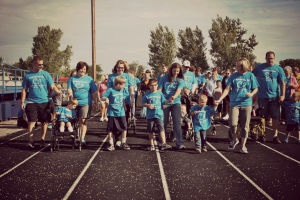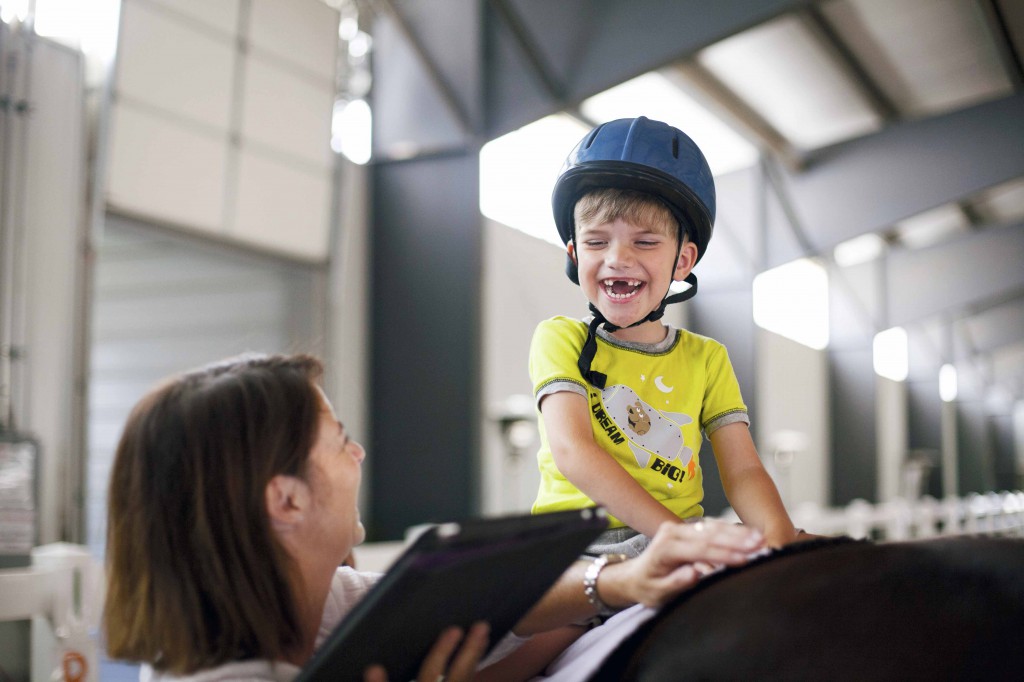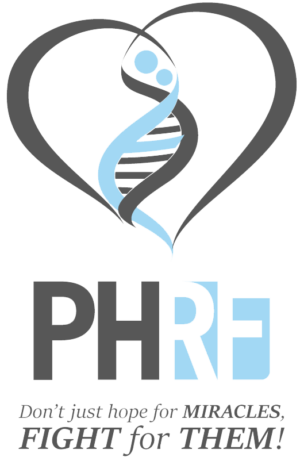“The whole idea of compassion is based on a keen awareness of the interdependence of all these living beings, which are all part of one another, and all involved in one another.” – Thomas Merton

I love this quote. It fits perfectly for what this blog post is about.
I had the honor of interviewing a sensational mom of three boys, Lesley Skahan, of Iola, Kansas. She discusses her personal story with a disorder called, Pitt Hopkins Syndrome which affects her youngest son. With this said, September 18th is approaching and marks PTHS National Awareness Day.
Tell us about you and your family.
My name is Lesley Skahan and I am a stay-at-home mother in Iola, Kansas. I am married to Matt Skahan and we have been happily married for 15 years. We have been together since our teenage years where we met. Matt is an optometrist. We have three boys, Jake who is 9 and is in third grade, Gage who is 7 and in second grade, and Mason who is 4 and is in preschool at the ANW COOP Preschool. The ANW COOP is a preschool for children with developmental delays and disabilities and has peer models in each classroom. My youngest son Mason has a rare genetic disorder called Pitt Hopkins Syndrome. He is one of 250 children in the world who has been diagnosed.

What is Pitt Hopkins Syndrome?
Pitt Hopkins Syndrome(PTHS) is a disorder of the 18th Chromosome affecting a gene called TCF4. PTHS was first described in 1978. The connection to TCF4 was not discovered until 2007. The TCF4 gene was found to play a vital role in the development of the nervous system and the brain. Characteristics of PTHS are developmental delay, hypotonia(low muscle tone), distinct facial features, and gastrointestinal issues. Some children with PTHS also have seizures ranging from mild to severe. Many PTHS children will also have hyperventilation issues and breath holding. Most Pitt Hopkins children do not speak, however they are very capable of understanding. Overall, children with PTHS have a very happy demeanor with frequent laughter. Most PTHS children do learn to walk with the help of therapy.

How was Mason diagnosed?
We didn’t have a particular Doctor that lead us to find answers about what was going on with Mason and his delays. We saw a neurologist and an orthopedic doctor and they both said to keep an eye on him and and make follow up appointments to see how he does as he grows. We tried to get an appointment at Childrens in KC, but they were down a geneticist and we were put on a waiting list. I did some research online and discovered that Johns Hopkins Hospital in Baltimore had a hypotonia clinic and I knew Mason had hypotonia, so I figured I would send and e-mail to the Doctor who started the clinic, Dr. Cohn, a geneticist. I emailed him, giving him information on Mason and that we were hoping to get some answers. I wasn’t really expecting to hear anything back, but he returned an e-mail to me three hours later and it was a Saturday. We were so shocked! What doctor does that? For him to e-mail me back that quickly, we felt like it was meant to be.


We then headed to Baltimore. In September of 2011, we met Dr. Cohn and his staff. We even took pictures!! Yes, I made them feel like celebrities that day!! We were so grateful for someone to observe Mason and possibly give us some information, maybe even a diagnosis. After several questions and observation, Dr. Cohn sat down with us and informed us that Mason has a genetic disorder. Wow! That was something. A bit of information that could lead us somewhere! He said he didn’t know what it was, but that within in 5 years he could give us a diagnosis. Oh my goodness! I had to repeat his answer just to make sure I heard him right! We left his office-after the pictures of course-with such comfort knowing that there was a syndrome that we would be looking for. The relief we had was unforgettable. Matt and I had wondered if there was something we had done to cause Mason to be like he was. Was it the sling I put him in that he loved so much? (which had been recalled because of infant deaths because of suffocation). The countless things we thought as possibilities to Mason’s delays. We got home from Baltimore and a couple of weeks later we got a phone call from Children’s Mercy in KC. They were calling to make a genetic appointment. “We just went to Johns Hopkins, so we don’t need an appointment”, was my response. A few weeks after that, I got a call from a genetics counselor at Childrens Mercy in KC and she told me she saw where we had went to Baltimore and was hoping that they could give us some answers before 5 years. This definitely intrigued me! We set up an appointment in the Specialty Care clinic in January of 2012 and saw a neurologist, a muscle and nerve rehab doctor, and a geneticist – along with the genetic counselor who had contacted me.

The three doctors observed Mason individually and asked us several questions. The doctors then met together and discussed their findings. They came back to us after their discussion and informed us that Mason had distinct traits that were telling them it was genetic. Mason’s hands, his ears, his facial features, were all signs of a genetic cause. They suggested doing specific genetic testing for certain syndromes along with some other genetic tests. The genetics counselor called me at home a couple of weeks after our appointment and asked if we could add a new test that had just come out. Of course!! Luckily they did add this test, because it is the one that gave us Mason’s diagnosis. It is called a Rett 62 Autism Panel test. Mason was the first child with PTHS diagnosed on this new test.

Childrens Mercy took some pictures of him and asked for our consent for him to be written about in medical journals for Pitt Hopkins and the Rett 62 Autism Panel. We were thrilled to have a diagnosis and immediately began to look up information online about PTHS but with a little caution from our genetics counselor. She gave us certain sites to look up because she said there were some out there that may not have accurate data. We were told that it was really rare and that there was another family they had diagnosed with PTHS and that we may be able to get there information soon. They would have to be very careful about doing so in that they wouldn’t violate any HIPPA laws. I got a call from the other family who had a PTHS child – and come to find our they live an hour and twenty minutes from us! Wow! We have gotten together with them and did so recently. It is always refreshing because they have gone through the exact same thing as we have. We are definitely family!
What are his challenges?
Mason’s challenges are mostly physical. He is not able to walk, but we have high hopes that he will someday! He is not able to walk quite yet with us holding his hands and guiding him. He has a gait trainer that looks like a walker for typical children but is bigger and more industrial looking.


He still takes a bottle for the majority of his fluid intake as the muscles he has to use are of low tone. He does chew his food but we still are careful because he will tend to swallow things whole depending on the texture. He has a lot of sensory issues with hands. He is not able to feed himself or do any kind of pincer grasping. He can push buttons, pick up a toy, pull on something when asked too. It is more the fine motor that he has issues with his hands. Where the sensory gets involved, he doesn’t like his hands touched much. We do a lot of hand over hand for teaching him things and he does pretty well with that. But to grab his hand and try to hold on, not gonna happen!! He gets upset sometimes and probably a little overwhelmed when he is pushed to do a lot of OT(occupational therapy) with feeding.


Now if it is something he is interested in like a toy, much better luck. Finger painting, writing with a marker, that sort of thing, he does not like at all. He has some sensory issues with his head, but I feel that this has improved. He does not like to get his haircut and it used to be extremely traumatic for him. He does not like the sound of the clippers. He is not crazy about having his teeth brushed and I think that is probably sensory too.
One of his biggest problems he has had is gastrointestinal issues. This is very common among PTHS children. He has been hospitalized several times for GI problems.



Just this summer we have started him on a new diet and supplements and we feel it that we are on track to figuring out what is right for his gut. It has truly been life changing for him and for us parents!! He is on a gluten free, casein free(a milk protein), and soy free diet. We had tried a gluten free diet before and it was just too overwhelming. I think we had to hit rock bottom in order to realize that it didn’t have be so exhausting and just too much to put on our already full plate. It has been the best thing we have done for him and I owe it all to Amy Adamson, the other PTHS mom from Baldwin City,KS – our children are the only two in Kansas that have been diagnosed, at least with the international support group.
Besides challenges, what has he excelled at?
Mason is not able to speak, but he does understand. He is delayed developmentally, but I know he is much brighter than we give him credit for sometimes. Mason loves to have books read to him. Since at least two years old, he has been able to let us know he is ready for the page to be turned in a book. He used to tap on the book meaning “more” or “turn the page”. Now we may let the page come open a bit and he will actually turn it himself. He is able to make choices when given to items – whether it be a toy, a book, or a food.

Whether it be a toy, a book, or a food. He very much has a voice and an opinion! He loves music and will respond to music that he enjoys with a type of cooing noise. “Aaahhhh”, a positive response and he has his favorites too!!


He has come a long way physically but has had to work to get where he is. When he was 10 months old, he could not be on his tummy for tummy time for very long. I could tell he was physically in pain. His shoulders and upper body have always been weaker than his lower body. This is why we thought for so long that he was just a little behind and that he would catch up. His legs are very strong. He hyper-extends his knees and his feet pronate, or roll inward towards each other. He likes to stand on the balls of his feet rather than flat on them. He wears custom orthotics to help him keep his heels down and from the pronation.


Working with Mason’s daily obstacles, what kinds of things does your family do for fun?
We try to not let Mason’s challenges keep him or our family as a whole from not getting out and enjoying life. My two older children are very involved in sports, and Mason goes to almost all of their games. He enjoys being outside and loves to watch other children.

I tell my older boys that Mason comes to their games, so they can come and watch him do his therapy-usually after they say they don’t want to go. I hope they will grow up to be well rounded people – by the compassion and love they will experience from having a brother with special needs.



We have taken all of our boys to Walt Disney World, Silver Dollar City, the KC Zoo and many other museums and attractions. Mason loves to get out and see everything, just as typical children. The only thing that is different is that we may have to plan a little more or take another adult to help us. Halloween is approaching and I am already thinking of different things for him for this year. We made a costume with his wheelchair last year and it was a lot of fun!! Mason got to dress up as a fireman and drive his fire truck(wheelchair) around his school with all of his peers during their Halloween parade.


Tell us about your involvement in getting more public awareness about PTHS.
Our online support group has come together in raising money for research for PTHS. Being that PTHS is so rare, there is no current funding from the government or pharmaceutical company. It is up to us parents to raise money to provide research for the future of Pitt Hopkins Syndrome. The PTHS research foundation was recently started by PTHS families. We are all coming together to do our share in raising money.

Scientists are currently studying neuronal stem cells and mouse models for hope of reversing PTHS in people. Last year I had several items made – including t-shirts, bags, and car decals. When we had Mason’s birthday party, we asked that instead of gifts, we would rather have people donation to research. This would benefit Mason more than any toy. We still gave him plenty of new toys as well!


Along with fundraising, we as a group are always advocating for our children. Since our most of our children are unable to speak, it is important that we speak up for them. These children are beautiful and have so much to give. Our journey has not always been easy, but we wouldn’t change it for anything. Mason has showed us what life is all about. It is so simple : love life, don’t judge, and be happy.

He is all that God wants us to be. Mason has definitely strengthened our faith and taught us so much. Compassion most of all. Not sympathy or pity, but compassion. My two older boys are being shown a compassion that others don’t have the chance to experience. It is amazing to watch. They are Mason’s protectors and will always stand up for him. Awareness and educating others on how to be respectful and not hurtful. Blessed is what we are. So many people have come up to us and apologized. We need no apology. Mason is Mason and we love everything about him!

Our online support group has come together in raising money for research for PTHS. Being that PTHS is so rare, there is no current funding from the government or pharmaceutical company. It is up to us parents to raise money to provide research for the future of Pitt Hopkins Syndrome. Hope is in our genes. To find out more about PTHS, go towww.pitthopkins.org




 Liz loved sledding, and had overcome and healed from all of her foot surgeries, so this past year, Liz trained in Alpine skiing with me as her coach.
Liz loved sledding, and had overcome and healed from all of her foot surgeries, so this past year, Liz trained in Alpine skiing with me as her coach.




































 “My hero, Henry, was born on August 17, 2007, my third boy. He was healthy although smaller than my other children (birth weight of 5 lb 12 oz), he was otherwise perfect and beautiful.
“My hero, Henry, was born on August 17, 2007, my third boy. He was healthy although smaller than my other children (birth weight of 5 lb 12 oz), he was otherwise perfect and beautiful.
 He was going to ride a horse independently with a therapist and two volunteers at his side.
He was going to ride a horse independently with a therapist and two volunteers at his side. Liz and Henry and other kids with Pitt Hopkins are my heroes as they are defining in a very positive way what it means to have this diagnosis. Although the progress may be slow, they show great determination and growth, always with a smile on their faces.
Liz and Henry and other kids with Pitt Hopkins are my heroes as they are defining in a very positive way what it means to have this diagnosis. Although the progress may be slow, they show great determination and growth, always with a smile on their faces.

